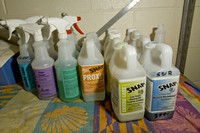Antolina Pittman says she no longer gets rashes or lung irritation when she uses the new Enviro-Care cleaning products, a green cleaning system adopted by Rutgers more than a year ago.
“Before, I used to get rashes from several of the products,” said Pittman, a custodian group leader for University Facilities and a Rutgers employee of 33 years. “I had to use gloves and a mask because they smelled so bad.”
“None of the new products have a scent that I can detect,” said Dale Baldwin, a custodian with 22 years of service at Rutgers.
Now that Facilities uses environmentally friendly cleaning products from the firm Rochester Midland, Pittman and other custodial workers are experiencing better work days and better health; a review of the absence records of 240 employees showed that they took 12 percent fewer sick days in the year since adopting the new products compared to the previous year.
“If we see that 12 percent again, then I’m convinced,” said Dianne Gravatt, director of environmental services and grounds. “Those are very tangible results.” Gravatt said another survey is planned this year to solidify the results.

Petroleum-based cleaning products generally are considered more “aggressive,” or more effective at cleaning tough messes. But for the daily maintenance cleaning that makes up a bulk of custodial work at Rutgers, those harsh chemicals are overkill.
“You can put a thumbtack in the wall with a sledgehammer, but then you damage the wall, when you can just push it in with your thumb,” said Dave DeHart, assistant director of environmental services. “We don’t need those aggressive chemicals on a chrome faucet everyday that isn’t even that dirty.”
When handed a mandate to “go green,” people working in F/MS sought out the top seven cleaning product manufacturers in the country. Then they requested all types of information: health ratings for each cleaning product, the chemical makeup of each product, a test setup of the dispensing system in a Rutgers classroom to be tested by the actual custodial staff.
“We did the most thorough review of green cleaning chemical manufacturers probably in the country,” DeHart said.
Rochester Midland met the grade in every way. Their products received the best health ratings according to the Hazardous Materials Identification System and the National Fire Protection Association. Four of their seven products were 100 percent bio-based, or made from agricultural products (corn or soybean oil, for example) versus petroleum products.
The New York state chemical company also had a simple-to-use chemical dispensing system that ensured no more than the proper amount of chemicals would be used. “We were wasting chemicals, putting more chemical into the waste stream than we needed to,” Gravatt said.
It also had a comprehensive multilingual training program. Company representatives were able to train custodians in English, Spanish, Chinese, Korean, Russian, and Arabic, as well as provide reference materials on how to use the products in each of those languages.
Prior to reorganizing more than two years ago, custodial services were administered and supervised with relative autonomy on each campus in New Brunswick and Piscataway. Gravatt attributes the success Rutgers has had in environmental initiatives to a more centralized structure and the leadership of Antonio Calcado, vice president for facilities and capital planning.
“We had to do a lot of soul searching as we got into this. We thought it was going to cost us more money,” Gravatt said. “Tony Calcado’s comment was that we have to do the right thing for our employees and our students.”
The efforts of the product evaluation team have been hailed: The group won a 2006 Bridge Award as part of the President’s Staff Recognition Program.
“We are striving to be the most environmentally conscious university in the country,” said DeHart. “We feel the biggest difference we can make will be when we convince other institutions to go green.”